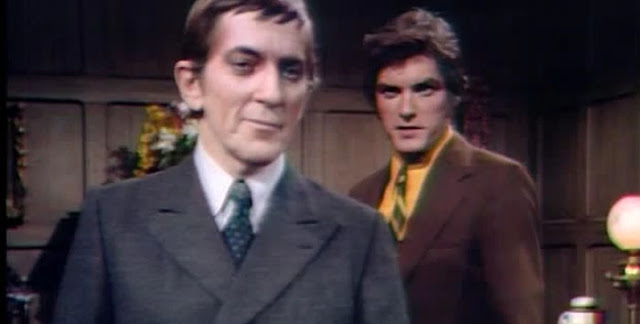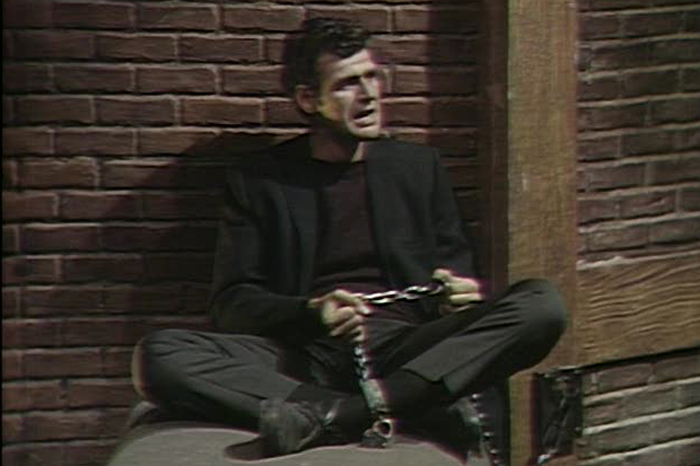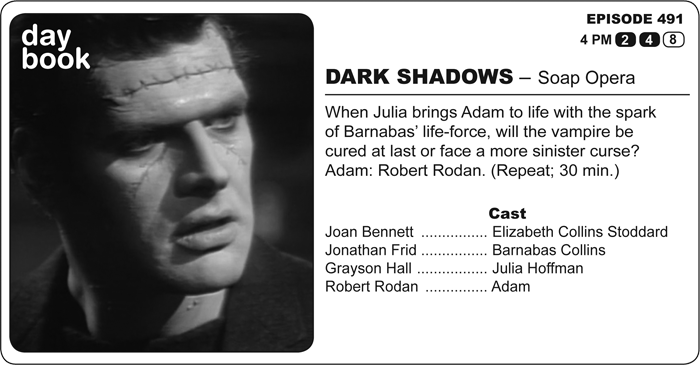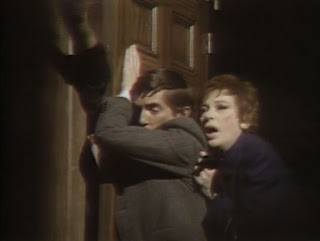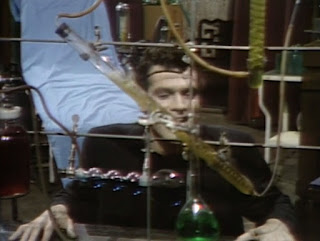By PATRICK McCRAY
Taped on this day in 1970: Episode 1013
When a transporter accident finds Barnabas in Angelique’s bedroom, will it cause Daniel’s voice to drop two octaves? Daniel Collins: David Henesy. (Repeat; 30 min.)
Barnabas and Quentin chat about Parallel Time, and while loitering in the room alone, Barnabas is discovered by Daniel. Meanwhile, an ugly and inaccurate portrait of Maggie arrives from Italy, initiating Quentin’s knife-wielding psychotic break.
Solve a mystery. Get out of town. Become a flaming sword of art criticism. So many choices for a tourist. Barnabas Collins is a busy man in Parallel Time. As is the show, having near-slumbered in a pleasant irrelevance for weeks now with David Selby charged with making Quentin as evil as possible, Lara Parker exploring why playing anyone other than Angelique is boring, and Chris Pennock eviscerating a philosophically Byzantine meditation on good and evil from under profoundly bad hair.
Dark Shadows continues a comeback so powerful that it shakes up the view of the show as it’s recently been and accidentally sets a bar for imaginative entertainment that the upcoming movie will be hard-pressed to match. You can almost hear Joe Caldwell telling Sam Hall and Gordon Russell to hold his martini and stand back. He wrote half of the PT storyline, and now that he has the casting keys to the car, I hope it’s insured. It strikes me as a show he tended as well as he could while everyone was away, because he’s been planning exactly where he wants to go.
It’s a rich, teasingly absurd, and breakneck episode that begins with Quentin and Barnabas wasting no time talking about what they saw in Primary Time. Quentin suspects that Barnabas has crossed over, and his reason for concern is hilariously valid. Primary Time referred to him as ‘cursed,’ and that’s enough to count Quentin out. I’m glad that modern-day Parallel Time takes curses seriously. Maybe they watch Dark Shadows over there. Maybe that’s how Quentin knows that curses are bad luck. Hey, what a minute. If they make Dark Shadows in Primary Time and watch it in Parallel Time, does that make us… Parallel Time, too? I wonder who I am over there. Whatever he is, his hair is bigger.
It leads into a lovely scene where detente has been called and the two men, Jonathan Frid and David Selby, get to do something they’ve done very little of in a long time: act together. They more-or-less sit and chat. We see two generations of acting styles in a peculiar dance across the drawing room, and it might as well be across the Atlantic as well. Selby’s more relaxed, yet Frid seems like he’s working less and maybe having a tad more fun. He finally gets to openly admit that he finds Angelique attractive without it becoming the talk of the Collinsport High cafeteria.
Of course, all Barnabas wants to do is leave. So much so that he uses his rare power of teleportation to skip the front door and beam directly into the room. If he can do that, I wish he would just hide out in a closet there and wait for the changeover. But he would have to find an excuse. The only logical one would be transvestism, which would mean long hours trying on Angelique’s outfits. If he liked it, what then? And is he only a transvestite for her PT wardrobe? And then what’s he do when Daniel comes in? Am I the only one who notices that David Henesy’s voice has changed? The whole subject should make us all uncomfortable. Not because transvestism is wrong. But because they are not his clothes, and in no universe does Brewsters carry a merry widow in a 44 long. Daniel is going to inherit those clothes one day, and they don’t need to be all stretched out by Barnabas.
Back to teleportation, please. I mean, if you don’t mind. Stop accusing Barnabas of these things. He’s a Canadian for god’s sake.
So, he teleports very rarely. Is it when he’s just fed? Or is it because he’s in a mirror universe, and he’s a little showier because that’s what you do on vacation? Or did his powers sort of bottle up when he was in the coffin all those weeks? (And let me ask you this, in a mirror universe, should people only see his reflection? That’s creepy, and god forbid a vampire be that.) He has to let them out. Because, in the Barnabas superpower department, he’s really a showboat in this one, using all sorts of abilities that would have come in handy if only he hadn’t borrowed Sam Hall’s Neil Sedaka records and refused to give them back. That’s the real reason the writers were so stingy with the guy.
Players of RPG’s should especially sympathize with Barnabas since he’s like a character who has to roll dice to see if he can use an ability. But he rolls a natural 20 with hypnotizing Daniel, and you have almost see Barnabas snap his fingers of his left hand into the flattened palm of his right and muse, “Still got it, baby. Still got it.”
The real villain of this episode is the props department. Who doesn’t get a great portrait on the show? Barnabas gets two. Quentin gets two. Angelique gets two or three (if you count the movie). So, yes, it’s Maggie’s turn. The portrait that Quentin had commissioned in Italy is, um… it’s to portraiture what the Tower of Pisa is to perpendicularity. KLS deserves better, and I don’t think it’s out of order to send letters to MPI demanding a digital fix. On a show with very good props, this is embarrassingly bad. It’s not even symbolic of a prop. No wonder Quentin takes a knife to it.
It’s both the low and high point in an episode of high points, and it is one of the rare points that the forgivable theatricality of the show begins to buckle.
When Kramer gets a better portrait than Maggie Evans Collins, it’s time to sit down with the art department, tell them that you’re sorry for being away so long shooting the movie, and that you promise to take them with you next time.
Do the right thing.
This episode hit the airwaves on May 13, 1970.

